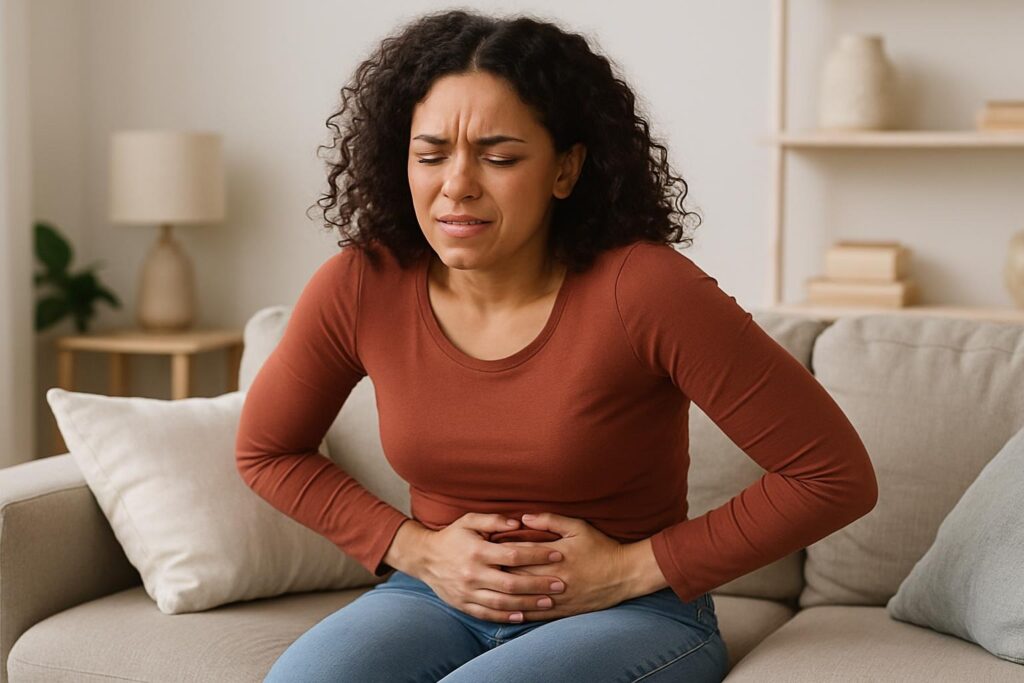Period cramps, also known as dysmenorrhea, affect many women around the world, causing discomfort and pain that can interfere with daily activities. While over-the-counter medications can help, some prefer natural remedies to alleviate their symptoms without side effects. In this comprehensive blog post, we will explore 10 effective natural remedies to relieve painful period cramps, backed by research and traditional wisdom.
Understanding Period Cramps
Before diving into remedies, it’s essential to understand why period cramps occur. During menstruation, the uterus contracts to shed its lining. These contractions are triggered by hormone-like substances called prostaglandins. Higher levels of prostaglandins are associated with more severe cramps. Cramps can range from mild to debilitating and may be accompanied by other symptoms like nausea, headache, and fatigue.
1. Heat Therapy
Applying heat to the lower abdomen is one of the simplest and most effective ways to relieve menstrual cramps. Heat helps relax the muscles of the uterus and improves blood flow, reducing pain.
How to use: Use a heating pad, hot water bottle, or warm towel on your abdomen for 15-20 minutes. Warm baths can also provide relief.
Scientific support: Studies have shown that applying heat can reduce pain as effectively as some pain medications.
2. Herbal Teas
Certain herbal teas have antispasmodic and anti-inflammatory properties that help soothe cramps.
- Chamomile tea: Known for its calming effects, chamomile also relaxes uterine muscles.
- Ginger tea: Ginger has anti-inflammatory properties and can reduce pain and nausea.
- Peppermint tea: Acts as a muscle relaxant and can ease cramps.
How to use: Drink 2-3 cups of herbal tea daily during your period.
3. Regular Exercise
While it may seem counterintuitive to exercise during cramps, light to moderate physical activity can improve blood circulation, release endorphins (natural painkillers), and reduce stress.
Recommended activities: Walking, yoga, swimming, or gentle stretching.
Scientific support: Research indicates that women who exercise regularly experience less severe menstrual pain.
4. Dietary Adjustments
What you eat can influence the severity of period cramps. Certain foods can help reduce inflammation and ease pain.
- Increase intake of omega-3 fatty acids: Found in fish, flaxseeds, and walnuts, omega-3s have anti-inflammatory effects.
- Eat more fruits and vegetables: High in antioxidants and fiber, they promote overall health.
- Limit caffeine and salty foods: These can increase bloating and worsen cramps.
Tip: Maintain a balanced diet throughout the month for best results.
5. Magnesium Supplements
Magnesium plays a role in muscle relaxation and may help reduce cramping.
Sources of magnesium: Leafy greens, nuts, seeds, and whole grains.
Supplement use: Some women find relief by taking magnesium supplements during their period, but consult a healthcare provider first.
6. Acupuncture and Acupressure
Traditional Chinese medicine techniques like acupuncture and acupressure can help manage period pain by stimulating nerves and muscles, releasing endorphins, and improving blood flow.
How to use: Visit a licensed practitioner for acupuncture or learn acupressure points to massage yourself at home.
Scientific evidence: Several studies suggest acupuncture can reduce the intensity and duration of menstrual cramps.
7. Aromatherapy
Essential oils can provide pain relief and relaxation when used in aromatherapy.
- Lavender oil: Known for its calming and pain-relieving properties.
- Clary sage oil: Can reduce menstrual pain and balance hormones.
- Peppermint oil: Provides a cooling sensation and helps ease muscle tension.
How to use: Add a few drops to a diffuser, bathwater, or dilute with a carrier oil and massage onto the abdomen.
8. Adequate Hydration
Staying hydrated helps reduce bloating and eases muscle cramps.
Tip: Drink plenty of water throughout the day, and include hydrating foods like watermelon and cucumber.
9. Stress Management Techniques
Stress can exacerbate menstrual pain by increasing muscle tension and hormonal imbalance.
Effective methods include:
- Meditation
- Deep breathing exercises
- Progressive muscle relaxation
- Mindfulness practices
Incorporating these techniques can improve your overall well-being and reduce period discomfort.
10. Vitamin B1 (Thiamine) and Vitamin E
Some studies indicate that vitamins B1 and E may help reduce the severity of menstrual cramps.
- Vitamin B1: Helps improve nerve function and muscle tone.
- Vitamin E: Has antioxidant properties that may reduce prostaglandin production.
Sources: Whole grains, nuts, seeds, spinach, and fortified cereals.
Supplementation: Consult your healthcare provider before starting any vitamin supplements.
Additional Tips for Managing Period Cramps Naturally
- Maintain a healthy weight: Excess weight can worsen cramps.
- Avoid smoking and alcohol: Both can increase inflammation.
- Get enough sleep: Proper rest supports hormonal balance.
- Track your cycle: Understanding your pattern can help you prepare and manage symptoms better.
When to See a Doctor
While natural remedies can be highly effective, severe or persistent pain may indicate underlying conditions such as endometriosis or fibroids. If your cramps:
- Are debilitating and interfere with daily life
- Do not improve with home treatments
- Are accompanied by heavy bleeding or unusual symptoms
Seek medical advice promptly.
Conclusion
Painful period cramps can be challenging, but many natural remedies offer relief without the side effects of medications. Heat therapy, herbal teas, exercise, dietary changes, supplements, and mind-body techniques can all play a role in reducing discomfort. Experiment with these approaches to find what works best for you, and always consult a healthcare professional if you have concerns.
By embracing these natural strategies, you can take control of your menstrual health and enjoy a better quality of life during your periods.
